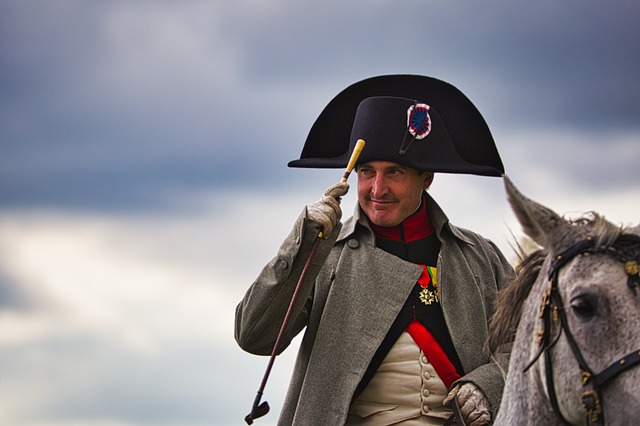Napoleon was well on his way to dominating Europe by 1804. After the French Republic, he declared himself emperor of France, and with the help of his military prowess and well-trained troops, he conquered Italy, Spain, and Austria while bringing Austria to its knees. Napoleon's sly diplomacy prevented the powers of Europe from uniting against him. The only nation that remained impartial during Napoleon's ascent was Prussia. Frederick the Great left Prussia with a strong military legacy, but its force had lost its elite leadership and training, and its triumphs were now 50 years old. The English royal family's native state of Hanover, which is currently ruled by Napoleon, was the object of Prussian King William III's passion.
William finally decided to take a stand in May 1804, when he joined the Third Coalition, uniting Prussia with Austria, Russia, and England. In spite of Austria's advance into Bavaria in September, William acted as a submissive partner. Even after French troops crossed the Prussian principality of Ansbach, he refused to commit his troops. William signed the Convention of Potsdam, when the Russian tsar requested that Prussian forces be committed to the protection of the coalition, but he would not uphold the treaty. Thus, only Russian and Austrian troops suffered losses as a result of Napoleon's victory at Austerlitz.
Following Austerlitz, William dispatched an embassy to Vienna in an effort to persuade Napoleon that Prussia had not been a part of the alliance. Napoleon was not deceived, and he suggested a deal in which Prussia would relinquish some of its land to France, cut its links with the other members of the coalition, and forge an alliance only with France. Hanover would be given to Prussia in exchange because Napoleon anticipated that it would generate conflict between Prussia and England. Napoleon imposed further requirements as William hesitated to sign the Treaty of Vienna, including the need to close all ports on the North Sea and confiscate all English ships and cargo. William made a sign.
Napoleon, dissatisfied with his humiliation of Prussia thus far, founded the Confederation of the Rhine, a grouping of lesser German nations that posed a threat to Prussia's historical dominance in northern Germany. In addition, England's declaration of war on Prussia over Hanover and the seizure of numerous German ships in English ports harmed Prussia. Louise, William's wife, persuaded him to be firm and defend his country's honor after learning that secret peace feelers were being sent from London and Moscow toward Paris.
The Grande Armée of Napoleon was too strong for Prussia's army to handle. The Prussian army had not been put to the test in war in many years, although still having a quarter million soldiers. Its youngest high commanders were in their fifties, and its organization, tactics, and weapons were all decades old.
They fully misunderstood Napoleon's prior tactics and believed he would defend himself when they approached him. As a result of their sluggish mobilization plan and lax security, Napoleon learnt of their plans and launched his campaign with his customary haste to advance the Prussians. Napoleon's soldiers had already crossed Prussia's borders when Prussia declared war on France on October 7, 1807.
The first fight was fought the next day, and Napoleon won at Rudolstadt, killing Prince Louis of Prussia in the process. Napoleon won yet another of his stunning triumphs a week later at Jena. He decimated a Prussian corps while Marshal Davout, one of his subordinates, discovered the majority of the Prussian army at Auerstadt in a distraction attack. Davout's bold leadership of his forces, while being outnumbered, forced a Prussian withdrawal. By October 24, Napoleon had arrived in Berlin and Prussia had been destroyed. Napoleon imposed severe reparations on Prussia, but instead of immediately collecting them, he chose to remain there and use it as a base for potential operations against Russia.
Following the French victory at Friedland in 1807, Tsar Alexander and Napoleon agreed to work together against England by signing the Treaty of Tilsit. Napoleon compelled Prussia to give Russia its territories in Poland in exchange. After securing his eastern flank, Napoleon started gathering the remaining Prussian reparations. Napoleon's denigration of Prussia by the French aroused widespread opposition to him. The army realized it could not rely on the victories of Frederick the Great as the Prussians yearned for retribution.
The seeds of Napoleon's demise were planted when he invaded Prussia. Napoleon introduced the lessons of the French Revolution to Prussia even though the populace grew to despise him. The same nationalism that defended France from European adversaries also drove Prussia, which combined with the rest of Europe in 1813 to exploit Napoleon's frailty and played a role in his ultimate defeat at Leipzig in 1814 and Waterloo in 1815. The Prussian General Staff was reorganized in order to modernize the armed forces and put an emphasis on studying the lessons from this and previous conflicts. In the late nineteenth century, it developed into a military structure that the rest of the world would imitate.

References:
Chandler, David, The Campaigns of
Napoleon (New York: Macmillan, 1966); Home,
Alistair, Napoleon, Master of Europe, 1805–1807
(New York: Morrow, 1979); Markham, Felix,
Napoleon and the Awakening of Europe (London:
English Universities Press, 1954).
Posted using Proof of Brain

This is a great snapshot of Napoleon and his influence on historical events. I came across an infographic in one of Edward Tufte's books that shows Napoleon disastrous invasion of Prussia:
The brown thick line represents the number of men in Napoleon's army as they marched into Russia, while the thinner black line is the number of men retreating. Crazy!
Amazing info, thanks for sharing!
Posted using Proof of Brain